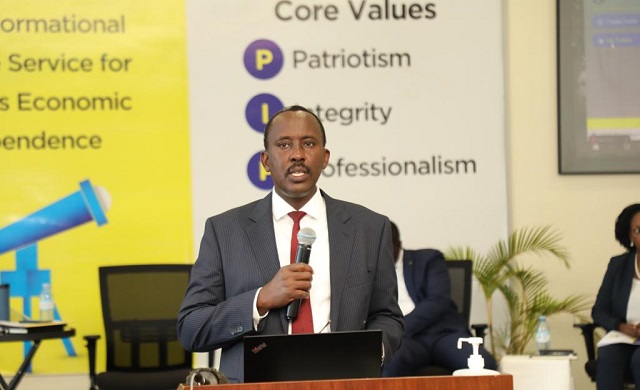
Kampala, Uganda | THE INDEPENDENT | Uganda Revenue Authority reports a surplus collection for the month of January 2023, giving hope of meeting the year’s target of 25 trillion Shillings.
The 14-billion-shilling surplus has reduced the shortfall that was registered for the first half of the financial year 2022/2023 from 94.6 billion to now 80.6 billion Shillings. The month’s total net collections amounted to 2.093 trillion Shillings compared to a target of 2.078 trillion set by the Ministry of Finance, Planning and Economic Development.
The Assistant Commissioner of Corporate and Public Affairs Ibrahim Bbosa says this is an indicator that they will hit the 25-trillion-shilling target for the year.
As has been the case since the beginning of the financial year, domestic taxes continued to outperform the targets, this time raising 1.359 trillion Shillings during the month while the target was 1.344 trillion Shillings. Most of this surplus, according to URA, came from direct taxes namely; Pay-as-you-earn, Rental income tax and Casino tax which all surpassed their targets.
This financial year, URA is tasked to collect 25,151.57 trillion Shillings, which is 52.3 per cent of the total national budget. Bbosa says since the full reopening of the economy early last year and the increased oil and gas industry activities, the revenue sector is becoming stronger.
The target for July to December 2022 was 11.765 trillion Shillings but the net revenue collected during the period was 11.670 trillion. However, in this second half, URA is expected to collect 13.482 trillion plus the 94 billion to cover the deficit from the first half, if they are to hit the year’s target of 25.152 trillion Shillings.
URA Commissioner General John Musinguzi says they are confident they will meet the ministry’s target, because, according to him, the technical people must have forecast that the economic factors affecting the economy will favour higher collection.
Musinguzi says they hope collections continue improving though in this half year they have to collect more so as to meet the target which was already higher than that for the first six months of the financial year.
The measures in place include more tax education and sensitisation outreaches, including the URA Mobile Tax Office. The others are the continued roll-out of technology and use of data in revenue collection like the Electronic Fiscal Receipting and Invoicing System to more businesses, the skilling of staff, the implementation of performance management and integrity enhancements as well as stakeholder collaborations and engagements.
URA last month also launched a new client relationship management system (CRM) tool, which will help improve URA’s client dialogue, build a high-performing organisation and enhance accountability and integrity.
Musinguzi says this will enable more interaction with the public and it would empower the citizenry to demand accountability on what URA promises.
*****
URA
 The Independent Uganda: You get the Truth we Pay the Price
The Independent Uganda: You get the Truth we Pay the Price



